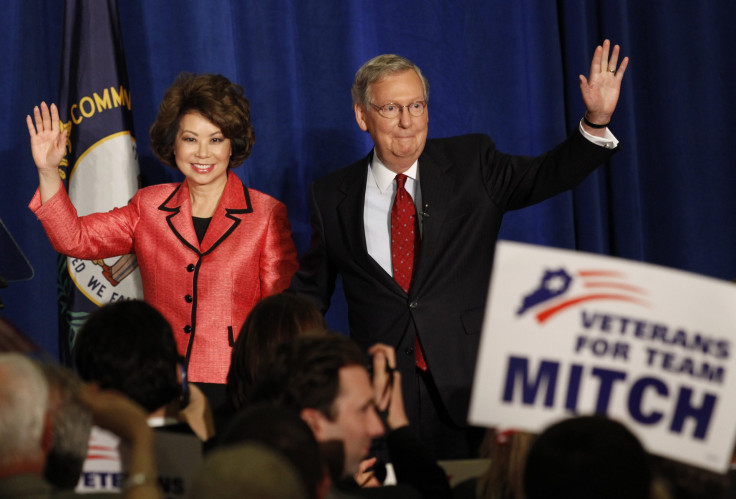Midterm Elections 2014: Why Senate Republicans Won't Have The ‘Tidal Wave’ Victory Many Predicted

Just two months ago, Republicans were overwhelmingly favored to retake the Senate from Democrats in November for the first time in eight years. With the national electorate leaning conservative and President Barack Obama’s approval rating hovering just around 41 percent, some analysts predicted a nearly 86 percent chance that Republicans would pick up the six seats they need for a Senate majority in the 2014 midterms.
But the latest polls in key states suggest Republicans will not have it so easy, after all. Democrats have built a formidable campaign war chest and outraised their Republican counterparts over the past year. Republicans also face a strong roster of incumbent Democrats, and analysts say midterm elections are decided by local or state issues, not national trends. The “tidal wave” Republican takeover some predicted is looking increasingly more like a ripple; political forecasters now say the GOP has a 53 percent chance at taking the Senate for the first time since 2006.
“You hit the reset button by the time you get to September,” Patrick Murray, director of the Monmouth University Polling Institute in New Jersey, told International Business Times. “This is when candidates start mounting a campaign that voters can see.”
With Republicans poised to stay in control of the House, a Senate GOP win would make it very difficult for Obama to get any of his remaining goals through a GOP-majority Congress during his final two years. A win for Republicans would likely put Minority Leader Mitch McConnell of Kentucky, an outspoken Obama critic, in the Senate driver’s seat, booting out Senate Majority Leader Harry Reid of Nevada, a close friend to the administration.
Right now, Democrats seem well-positioned to keep 45 of their 55 seats (counting two allied independents). Republicans will likely keep at least 43 of their 45 and are heavily favored to pick up three more currently held by Democrats in West Virginia, Montana and South Dakota. That leaves nine toss-up seats. Democrats currently control seven of them; Republicans, two. If the GOP holds on in Georgia and Kentucky, it will still need three more seats to win back the Senate.
The seats most in danger of flipping are all currently held by Democrats. They are Sen. Mary L. Landrieu of Louisiana, Sen. Mark Pryor of Arkanas, Sen. Kay Hagan of North Carolina, Sen. Mark Udall of Colorado and Sen. Mark Begich of Alaska. Their Republican challengers, however, are not as well known, and may struggle to win over voters.
Incumbency has several advantages, chiefly name recognition and fundraising. Incumbents also have an easier time running campaigns because they know how to target voters.
The GOP bench must overcome other hurdles. For example, Begich’s leading challenger, Dan Sullivan, while a well-known candidate, is currently being investigated for possibly benefiting from tax breaks he should not have received for a house he owns in Maryland. Analysts say this could derail his campaign, a race Republicans had felt confident they could win.
In Arkansas, where Pryor faces Rep. Tom Cotton, the race is a neck and neck. However, a proposal to gradually raise Arkansas’ minimum wage, something Arkansans overwhelmingly support, could play in Pryor’s favor after Cotton has remained vague on whether he would support the hike if elected.
In North Carolina, Hagan has an edge on her challenger, Thom Tillis, the speaker of the state House. North Carolina, usually a GOP-leaning state in Senate races, has become a battleground for Republicans over shifting attitudes toward hot-button issues like marijuana.
“Democrats have learned how to run races, and candidates matter,” John Dickerson, chief political correspondent for Slate magazine, said Friday. “The Republican brand is in trouble [and] Democrats have a lot of outside money. … They’re really good about running local campaigns against bad numbers.”
If Democrats survive this election cycle, it will be because they stayed focused on local issues instead of national ones, according to Dickerson. The money will not hurt, either.
In July, the Democratic Senatorial Campaign Committee saw its best second-quarter totals ever. It raised nearly $22 million that quarter, bringing its total to $95.8 million, according to the Federal Elections Commission. The National Republican Senatorial Committee, meanwhile, has raised $70.3 million.
Ultimately, the results of the midterm elections are anyone’s guess.
“Nobody knows for sure which party is going to hold the senate after this election,” Robert Erikson, a professor of political science at Columbia University in New York, told IBTimes. At this point, still 60 days away from Nov. 4, the polls “probably have larger margins” of error than are reflected right now, he said.
© Copyright IBTimes 2024. All rights reserved.












